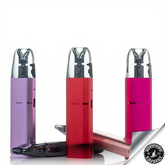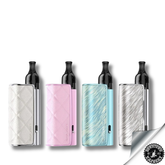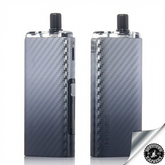Understanding Vape Starter Kit Terminology: A Glossary for Beginners
Introduction
Vaping starter kits can seem like a world of unfamiliar words: coils, pods, ohms, nic salts… What do they all mean? This glossary‑style guide is designed to demystify vape terminology for newcomers, empowering you with the confidence to make informed decisions. Not only will you recognise key components and concepts, but you’ll also understand how they affect your experience—safety, flavour, vapour, and nicotine hit—all crucial to choosing the right device. Let’s dive in.
1. What Is a Vape Starter Kit?
Starter kits bundle everything you need in one package:
-
Battery (internal or external)
-
Coils or pods
-
Charger and mouthpiece
-
Sometimes pre‑filled e‑liquid
These kits are ideal for beginners, usually offering:
-
User‑friendly design (auto‑draw or single button)
-
Moderate power output (typically 10–30 W)
-
MTL (mouth‑to‑lung) airflow for beginners
Organising terminology by device types helps in understanding your kit’s components.
2. Vape Device Types Explained
2.1 Pod Systems
Compact, sleek, pocket‑friendly devices using refillable or disposable pods. Great for:
-
Nicotine salts
-
Convenience and simplicity
2.2 Vape Pens
Slim, pen‑shaped devices with refillable tanks and moderate power (10–20 W). Ideal for:
-
Beginners seeking a familiar look
-
MTL vaping
2.3 All‑in‑One (AIO) Devices
Pods and batteries combined in one unit—no fiddling with separate components. Advantages:
-
Simplicity
-
Built‑in batteries (USB charge)
2.4 Box Mods (Very Brief)
Larger, advanced vaping devices boasting adjustable wattage, temperature control, and customisation. Suited to experienced users—only helpful to know what terminology leads to.
3. Common Hardware Terms Defined
3.1 Battery
Provides power to heat coils. Key specs:
-
Internal vs external cell
-
Capacity in mAh (e.g. 1 500 mAh)
-
Recharge via USB or removable charger
3.2 Tank vs Pod
-
Pods fit neatly into compact systems—either pre‑filled or refillable.
-
Tanks hold more e‑liquid and are used in more advanced kits.
3.3 Coil / Atomiser
-
The coil is the heating wire (wrapped around wicking material) that turns e‑liquid into vapour.
-
Often housed in a coil head or atomiser.
3.4 Drip Tip
The mouthpiece you inhale through—can be replaced to affect airflow and feel.
3.5 Airflow Control
Adjustable vents control how tight or loose each inhale feels—MTL vs DTL.
4. Vape Juice & E‑Liquid Basics
4.1 What Is E‑Liquid?
A mix of:
-
PG (propylene glycol) – carries flavour and throat hit
-
VG (vegetable glycerin) – produces vapour
-
Nicotine – freebase or salt
-
Flavourings – from fruit to dessert
4.2 Freebase vs Nicotine Salts
-
Freebase nicotine delivers stronger throat hit, best at lower strengths (<12 mg/ml).
-
Nic salts are smoother at higher strengths (20–50 mg/ml), ideal for MTL devices.
4.3 Common Flavour Categories
-
Fruity, menthol, dessert, tobacco
-
Choose based on your taste preference and device compatibility
5. Understanding Ohms, Wattage & Resistance
5.1 Ohm (Ω)
Measure of electrical resistance: lower ohms = faster heating and more vapour; higher ohms = cooler hits and slower vaping.
-
Sub‑ohm = <1 Ω (DTL/cloud chasing)
-
High‑ohm = ≥1 Ω (MTL/long battery life)
5.2 Wattage & Voltage
-
Wattage = power output; higher = more vapour/flavour.
-
Voltage = energy supplied to coil.
-
Many starter kits default to a safe wattage for included coils.
5.3 Selecting Safe Resistance
Beginners should stick to:
-
1.2–1.8 Ω
-
10–20 W
-
Check coil’s printed specs for optimal range.
6. Types of Coils and How They Work
6.1 Pre‑built vs Rebuildable
-
Pre‑built coils come ready-made—ideal for starters.
-
Rebuildable coils (RTA/RDA) require manual construction—advanced use only.
6.2 Mesh vs Traditional Wire
-
Mesh offers even heating and enhanced flavour.
-
Kanthal, Nichrome, stainless steel are common coil materials.
6.3 Coil Replacement and Lifespan
-
Change coils every 1–2 weeks or when flavour dulls or taste burns.
-
Lower resistance and sweet e‑liquids reduce lifespan.
7. Battery Safety and Charging Tips
7.1 Safety Basics
-
Avoid unauthorised batteries
-
Use proper chargers
-
Never leave charging batteries unattended
7.2 Charging Methods
-
Wall adapter = faster charging
-
USB = convenient but slower
-
Avoid overcharging—disconnect when full
7.3 Understanding mAh
-
Higher mAh = longer use
-
1 000–2 500 mAh typical for starter kits
8. Vape Modes & Settings
8.1 Wattage Mode
Most basic mode: set power output (e.g., 15 W), and device adjusts voltage automatically.
8.2 Temperature Control (TC)
Advanced kits let you cap coil temperature to prevent dry hits.
8.3 Bypass Mode
Emulates mechanical mods, delivering full battery power—risky and unsuitable for beginners.
8.4 Customisation Features
Adjustable airflow, screen brightness, puff counter—enhances safety and experience.
9. Vape Inhalation Styles: MTL vs DTL
9.1 Mouth‑to‑Lung (MTL)
-
Inhale to mouth, then lungs—mirrors smoking
-
Restrictive airflow
-
Best with nicotine salts
9.2 Direct‑to‑Lung (DTL)
-
Inhale straight into lungs
-
Open airflow, big clouds—sub‑ohm devices
-
Lower nicotine (3–12 mg/ml) to avoid harshness
9.3 Restricted DTL
Hybrid style between MTL and DTL—balanced vapour and throat hit.
9.4 Choosing Your Style
-
MTL = easy transition, smaller devices
-
DTL = bigger flavour, more battery usage
10. Maintenance & Troubleshooting Terms
10.1 Priming a Coil
-
Add a few drops of e‑liquid to wick before first use to avoid dry hits.
10.2 Common Problems
-
Flooding = over‑saturated coil
-
Dry hit = burnt taste, caused by lack of e‑juice
-
Leaking = loose seals or filling errors
10.3 Cleaning Tips
-
Rinse tank parts under warm water
-
Change coils regularly
-
Wipe connection threads for optimal conductivity
11. Vape Legislation & Age Restrictions
11.1 Legal Age
-
Most countries require users to be ≥18 (SA/UK specific: 18).
11.2 Nicotine Limits & Labelling
-
EU limits freebase nicotine to 20 mg/ml in sealed pods/tanks
-
Flavour and strength must be clearly stated
11.3 Bans and Marketing Restrictions
-
Adults‑only points of sale are common
-
Ban on unauthorised advertising near schools or in public
11.4 Responsible Retailing
-
Always purchase from regulated outlets
-
Unauthorised products risk quality and safety issues
12. FAQs: Vape Terminology Demystified
Q: What’s the difference between a coil and an atomiser?
A: A coil is the heating wire + wick; the atomiser/or coil head houses that assembly inside the tank or pod.
Q: How do I choose the right e‑liquid?
Match: Device type → inhalation style → PG/VG ratio + nicotine strength.
Q: Is sub‑ohm vaping safe for beginners?
Not ideal—sub‑ohm requires advanced safety awareness (battery, wattage, airflow).
Q: What wattage is safest for new users?
Start with 10–20 W using 1.2–1.8 Ω coils. Increase gradually if needed.
Q: Do I need to worry about battery safety?
Absolutely—use the correct charger, avoid overcharging, and select reputable batteries.
Conclusion
Understanding starter kit terminology equips you to vape safely, confidently, and enjoyably. You’ve learned:
-
Device types and components (pods, tanks, coils, airflow)
-
Key specifications (ohms, wattage, battery mAh)
-
Nicotine formats (freebase vs salts)
-
Inhalation styles and their device matches
-
Essential maintenance and legal considerations
🔧 Your Next Steps
-
Decide: MTL or DTL?
-
Pick a starter kit with clear specs and safety features
-
Choose an e‑liquid that matches your style and nicotine preference
-
Practice safe charging and coil maintenance
-
Ask questions in‑store or online to build experience
Expert Advice & Call to Action
Stay informed—regulations, device safety, and e‑liquid standards are evolving. Join reputable vaping communities, read official guides, and prioritise trustworthy retailers. Your vaping journey should be informed, safer, and more enjoyable.
Ready to start? Choose your kit wisely, understand its terminology, and enjoy a tailored vaping experience. If you’d like personalised advice or a step‑by‑step device recommendation, just ask!







